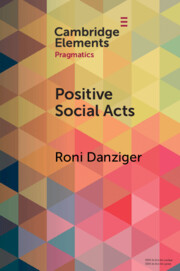Element contents
Positive Social Acts
Published online by Cambridge University Press: 12 December 2022
Summary
Information
- Type
- Element
- Information
- Series: Elements in PragmaticsOnline ISBN: 9781009184410Publisher: Cambridge University PressPrint publication: 05 January 2023
References
Accessibility standard: Unknown
Why this information is here
This section outlines the accessibility features of this content - including support for screen readers, full keyboard navigation and high-contrast display options. This may not be relevant for you.Accessibility Information
- 15
- Cited by
